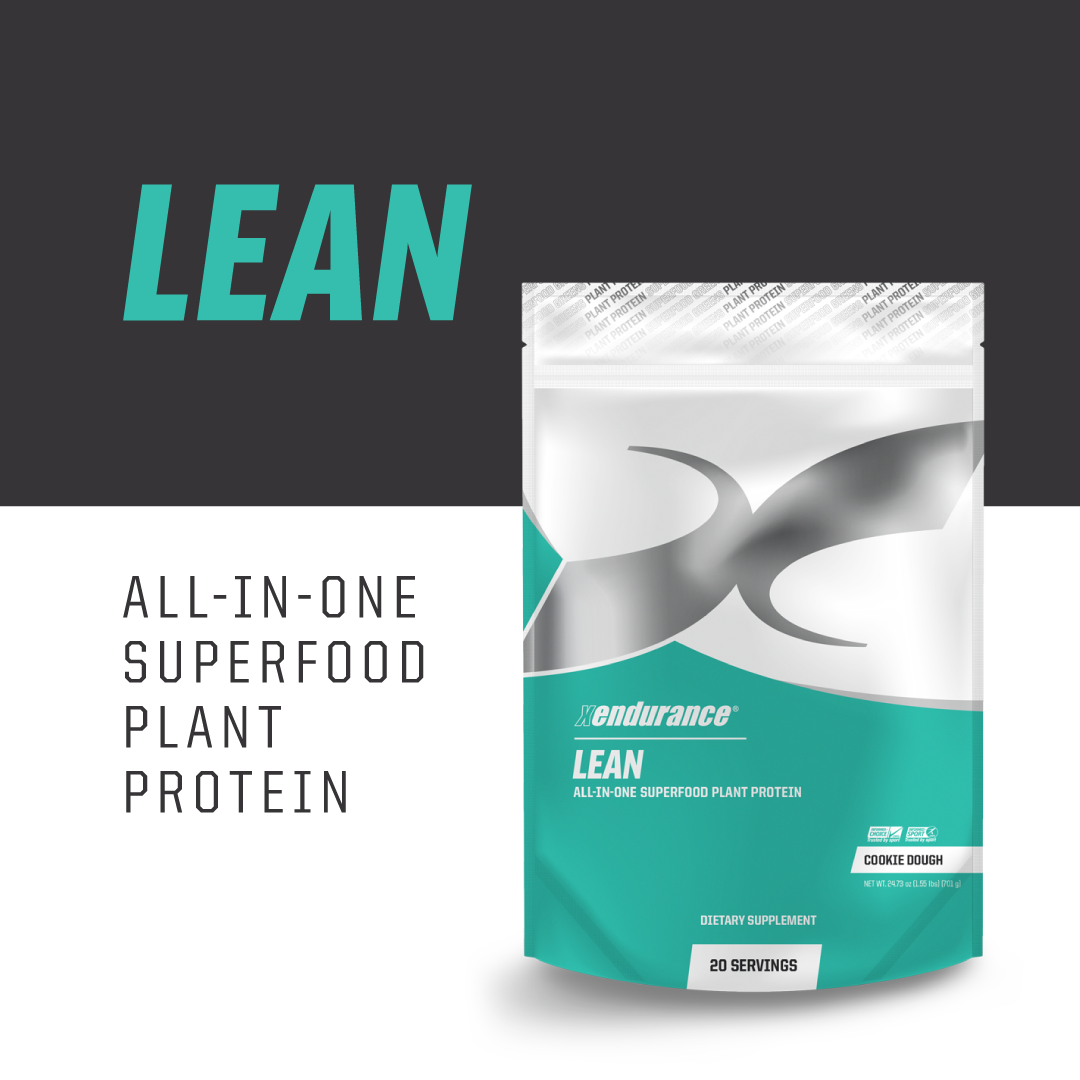Xendurance is proud to expand our product line of health and wellness products with LEAN: a comprehensive approach to plant-based protein. We understand that health-minded individuals come in all varieties, and that a majority of the protein supplements on the market are sourced from milk or egg products exclusively. There are also potential health complications associated when missing out on sufficient doses of the Essential Amino Acids (EAAs) found in animal protein sources. LEAN provides a plant-based option with none of those nutritional shortcomings.
For some, avoiding animal based proteins may be a simple ethical choice. Others are concerned about the continued sustainability of animal agriculture and the large environmental impact a high animal protein diet appears to have <1>. There’s also a portion of the population that is better able to treat autoimmune disease by eliminating forms of animal products, making plant-based options a nutritional necessity. Whatever the reasons, the amount of consideration over vegetarian and vegan lifestyle options appears to be at a high. Let’s explore why the facts about dietary protein, why it’s essential for your body to get the amino acids it needs, and how plant-based sources compare to animal based ones.
IMPORTANCE OF PROTEIN & EAAs
One of the primary concerns brought against vegetarian and vegan diets is the difficulty in securing enough daily protein intake. Humans need protein to survive. In fact, the amino acids that comprise proteins are essential for thousands of bodily functions and gene expressions. Diets low in protein are associated with a whole myriad of health problems: depression, lethargy, low bone density, hair loss, poor immune systems, advanced aging, just to name a few <2>. There are 20-21 amino acids that humans need, depending on who you ask, and 9 of those aren’t made inside the human body. Those are the Essential Amino Acids (EAAs) we talked about earlier, and they are named such because we will die unless we get them from food.
Animal protein sources such as meat and dairy have comparatively higher levels of EAAs against the most abundant plant sources <3>. But most common plant protein sources contain all 9 EAAs the body needs to survive. Each may be a little behind in one or the other, but it’s important that they’re present. Pea protein, the primary ingredient in LEAN, actually meets the World Health Organizations minimum requirements for EAA content.
LEAN BODY MASS & FAT LOSS
The issue of sufficient protein is particularly concerning for athletes performing at high levels or those with an active exercise routine. The body needs protein to mitigate muscle fiber damage from strenuous activity through Muscle Protein Synthesis, which is why options like Whey and Casein have been popular nutritional supplements for years. One of the purported mechanisms for muscle protein synthesis is the amino acid, Leucine. Pea protein possesses high enough leucine levels when compared with animal or dairy sources <3>. As long as you can ingest a comparable amount of protein with plant sources, the mechanisms controlling muscle protein synthesis should be comparable, keeping athletes fueled and recovered.
For those with weight-loss oriented goals, a diet with sufficient protein intake is typically the cornerstone of improving overall body composition. Protein is the most satiating macronutrient and has shown to be an effective focus in weight management <4>. Across all weight-loss studies, a large percentage of weight lost typically comes from lean muscle tissue, something those looking for improved physique and body composition will be disappointed to hear. Fortunately, a diet higher in protein can mitigate that lean tissue loss and cause the body to turn to fat stores instead during caloric deficits.
WHOLE FOODS VS SUPPLEMENTAL ABSORPTION
There are a variety of plant options that are protein rich, such as peas and chickpeas used in LEAN, or grains, lentils, nuts, legumes, and rice. However, the amount of plant product consumption necessary to rival their animal sourced cousins is often impractical and difficult in their whole food form. The relative absorption rate of protein whole foods plant sources is also typically much lower than an isolate source like the proteins in LEAN <5>. Plant protein whole foods typically are high in fiber and contain a myriad of other beneficial micronutrients, and no one should replace them with a supplement. But that’s exactly what LEAN is: a supplement to a healthy diet and active lifestyle that can help hit those daily protein requirements necessary to thrive. And to make up for it
With a robust amino acid profile from pea and chickpea sourced proteins, LEAN is an excellent choice for vegan and vegetarian users avoiding animal products. Fortified with B Vitamins meeting 40% of the recommended daily value that might otherwise be missed by avoiding animal proteins. Complete with a superfood blend to be consistent with the high levels of micronutrients in a health conscious diet. LEAN can help athletes continue to train hard and help dieters stay full during a fat loss plan. Give LEAN a try if you’re pursuing a plant-based lifestyle change or want a delicious protein supplement that tastes like cookie dough!
References
Scarborough, P., Appleby, P. N., Mizdrak, A., Briggs, A. D. M., Travis, R. C., Bradbury, K. E., & Key, T. J. (2014). Dietary greenhouse gas emissions of meat-eaters, fish-eaters, vegetarians and vegans in the UK. Climatic Change, 125(2), 179–192. doi: 10.1007/s10584-014-1169-1
Wu, G. (2016). Dietary protein intake and human health. Food & Function, 7(3), 1251–1265. doi: 10.1039/c5fo01530h
Gorissen, S. H. M., Crombag, J. J. R., Senden, J. M. G., Waterval, W. A. H., Bierau, J., Verdijk, L. B., & Loon, L. J. C. V. (2018). Protein content and amino acid composition of commercially available plant-based protein isolates. Amino Acids, 50(12), 1685–1695. doi: 10.1007/s00726-018-2640-5
Soenen, S., & Westerterp-Plantenga, M. S. (2008). Proteins and satiety: implications for weight management. Current Opinion in Clinical Nutrition and Metabolic Care, 11(6), 747–751. doi: 10.1097/mco.0b013e328311a8c4
Gorissen, S. H., Horstman, A. M., Franssen, R., Crombag, J. J., Langer, H., Bierau, J., … Loon, L. J. V. (2016). Ingestion of Wheat Protein Increases In Vivo Muscle Protein Synthesis Rates in Healthy Older Men in a Randomized Trial. The Journal of Nutrition, 146(9), 1651–1659. doi: 10.3945/jn.116.231340









Leave a comment
This site is protected by hCaptcha and the hCaptcha Privacy Policy and Terms of Service apply.